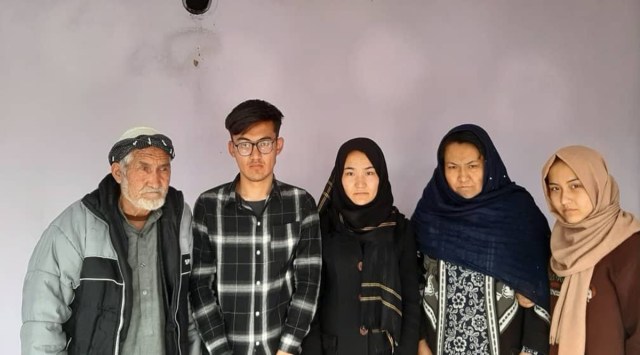More than a year after Islamic State terrorists gunned down 25 people at Sri Guru Har Rai Sahib gurdwara in Kabul’s Shor Bazar, the family of Mahram Ali Shaghasi, the 43-year-old Afghan Muslim security guard who fell to their bullets that day, reached Delhi — to begin a “better life”.
Mahram’s wife Fariba Gul Rok (40), son Abdul Wahid (23) and daughters, Murwarid (24) and Geeta (19), were among the 94 people, mainly Afghan Hindus and Sikhs, who landed on a special flight Friday.

Mahram, from Qalai Zaman Khan of Kabul, was the sole breadwinner of the family. He was the lone Muslim who was killed in gurdwara attack, all other victims were from Sikh community.
Story continues below this ad
On Friday, speaking to The Indian Express, Abdul Wahid said: “Our lives have been in danger there since the Taliban took over. There is no one to bring food and bear family expenses. Since my father’s death, we have had no breadwinner. There are no jobs and there is no scope to get educated. But our Sikh brothers, who my father died protecting, stood with us and helped us migrate to India.”
Referring to “the uncertain situation in Afghanistan”, Wahid said: “There’s hardly any hope there for a good future. We expect a better life here. We also plan to migrate to Canada after spending some time here… life has become terrible, especially since the Taliban took over.”
 Mahram Ali Shaghasi. (Express photo)
Mahram Ali Shaghasi. (Express photo)
It was on March 25, 2020, that gunmen stormed the gurdwara and opened fire. Among the 25 people killed was a three-year-old girl. Security forces rescued at least 80 others, including women and children, who were inside the complex at the time. The Islamic State claimed responsibility for the attack, which was described by India as a cowardly attack that reflected a “diabolical mindset”.
Following the attack, Wahid says the local Sikh community supported the family in “every possible way”. “They have borne our travel expenses and promised to provide us basic expenses for three months in India. They have also promised that they will help us apply to go to Canada,” he said.
Story continues below this ad
Describing his father, and recalling the day of the attack, Wahid said: “He was a very honest and hardworking man, dedicated to his duty. He was committed to protect the gurdwara from any harm. Although he never had any weapons, he guarded the premises 24×7. That day, my father tried to stop a gunman at the entrance. He was shot in the shoulder and fell down. But he got up again to put up a fight but then was shot in the head.”
 Their house in Qalai Zaman Khan of Kabul. (Express Photo)
Their house in Qalai Zaman Khan of Kabul. (Express Photo)
According to Wahid, Mahram shared a special bond with the Sikh community. “He knew that his job was very risky. But he loved doing it. He always respected the Sikh community and their faith. He used to say that all Sikhs and Hindus in Afghanistan are his brothers. He used to say that Sikhs are kind and nice people. In fact, he used to come home only once a week and stay at the gurdwara for the rest of the time. More than his family, he spent time with Sikhs and served the gurdwara,” he said.
Wahid says all that he wants is for the world to remember the sacrifice of his father and the fact that he never differentiated among people on the basis of religion. “Let the entire world know that he too died…while doing his duty, while protecting the gurdwara and his Sikhs brothers. Terrorists don’t know any religion. Had it been so, they wouldn’t have shot my father,” he said.
For now, Mahram’s family will be based in Delhi under the care of Sikh community at a gurdwara.
Story continues below this ad
“It wouldn’t have been possible for us to leave Afghanistan had it not been for Sikhs who took up our case with the government of India and we were allowed to board the special flight to Delhi,” he said.
As for returning to Afghanistan, Wahid says that will happen only “if there are better job and education opportunities”. “And above all, safety and happiness. My grandfather and elder brother are still in Afghanistan. It is never easy to leave your home, your country… but how can one live in fear of death each minute?”



 Mahram Ali Shaghasi. (Express photo)
Mahram Ali Shaghasi. (Express photo) Their house in Qalai Zaman Khan of Kabul. (Express Photo)
Their house in Qalai Zaman Khan of Kabul. (Express Photo)





